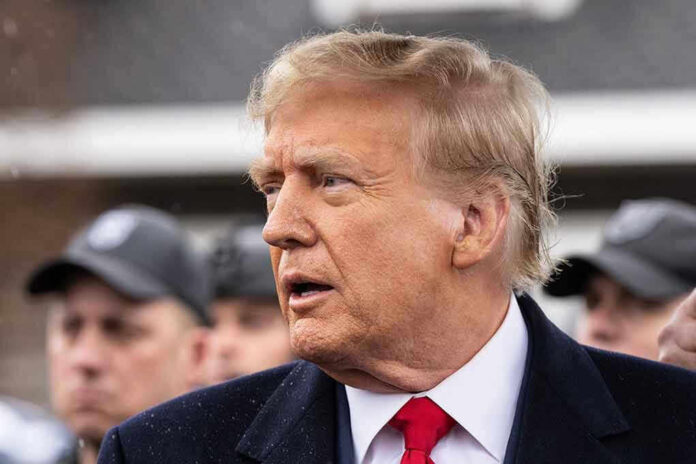A federal court ruling has blocked President Trump’s use of an 18th-century wartime law to rapidly deport Venezuelan migrants accused of gang ties, igniting fierce debate over executive power and border security.
Story Snapshot
- Court bans Trump administration from using the Alien Enemies Act to expedite deportations of Venezuelan migrants accused of gang membership.
- Ruling highlights legal limits on executive power and preserves judicial oversight in immigration enforcement.
- Decision follows a surge in Venezuelan migration and renewed concerns about gang activity at the southern border.
- Trump administration remains able to pursue deportations through other legal channels, but precedent restricts use of wartime statutes in peacetime contexts.
Court Ruling Blocks Alien Enemies Act Deportations
On September 2, 2025, a federal appeals court issued a pivotal decision blocking the Trump administration from using the Alien Enemies Act—a law dating back to 1798—to expedite the deportation of Venezuelan migrants accused of gang affiliation. The administration had argued that the influx of alleged gang members constituted an “incursion” akin to wartime aggression, justifying swift removal under this rarely invoked statute. However, the court found that the law’s intent was limited to armed, organized forces during declared war, not contemporary migration surges or criminal activity. This ruling effectively bars the executive branch from wielding this wartime authority for immigration enforcement, though other legal avenues for deportation remain available.
The legal battle began after several Venezuelan migrants, detained in Texas and accused of belonging to the “Tren de Aragua” gang, sued to prevent their removal under the Alien Enemies Act. A district court initially denied the migrants’ relief, while the Fifth Circuit Court of Appeals first claimed it lacked jurisdiction. The Supreme Court temporarily halted the deportations in April 2025, remanding the case for further review. The recent appellate ruling underscores the judiciary’s role in checking executive authority, particularly when historical statutes are used to address modern immigration challenges. The court’s statement was unequivocal: encouraging illegal entry is not equivalent to dispatching an armed, organized force to threaten the United States.
Historical Context and Executive Power Limits
The Alien Enemies Act was enacted during a period of heightened national security concerns in 1798, granting the president authority to detain or remove nationals of enemy countries during times of war. Its use has been rare in the past century, typically limited to global conflicts such as World War II. President Trump’s invocation of the Act in 2025 marked an unusual effort to expand executive power over immigration using historical legal tools. Critics, including legal scholars and civil liberties advocates, argue that such measures risk eroding constitutional principles, particularly due process and judicial oversight, which conservatives have long viewed as essential checks on government overreach.
This case also reflects ongoing tensions over border security and the administration’s broader crackdown on illegal immigration. The rise in Venezuelan migration—driven by political and economic turmoil abroad—led to increased enforcement measures targeting groups suspected of criminal activity. However, the judiciary’s ruling draws a firm boundary: executive actions must adhere to the original intent of longstanding statutes, and cannot circumvent due process or constitutional protections, regardless of public frustration with illegal immigration and lax border enforcement.
Judicial Oversight and Conservative Concerns
The decision has significant implications for the separation of powers and the future of immigration policy. By blocking the use of the Alien Enemies Act for fast-track deportations, the court reaffirmed the constitutional principle that even urgent security concerns must be addressed through proper legal channels. While the administration may continue to pursue removals under other immigration laws, the ruling sets a clear precedent against invoking wartime authorities for peacetime immigration enforcement. For conservatives, this outcome is a double-edged sword: it limits executive action in the face of persistent border threats, but it also preserves the constitutional checks that guard against unchecked government power—an essential protection for liberty and family values.
Court: Trump Can't Use Alien Enemies Act to Deport Members of Venezuelan Gang https://t.co/OMBfGJ4Cc3
— Joe Honest Truth (@JoeHonestTruth) September 3, 2025
The broader impact of this ruling could influence future policy debates and legal strategies. Advocacy groups such as the ACLU have praised the decision for upholding due process, while supporters of stricter immigration controls warn it may hamper efforts to address criminal infiltration at the border. Despite frustrations with judicial intervention, the court’s reasoning aligns with the conservative belief in limited government and the necessity of clear, constitutionally grounded statutes. As the country continues to grapple with border security and the rule of law, this case serves as a reminder that safeguarding American sovereignty must be balanced with respect for the legal frameworks that have long protected citizens’ rights.
Sources:
Federal Court Blocks Trump Administration Fast-Track Deportation Policy | ACLU











